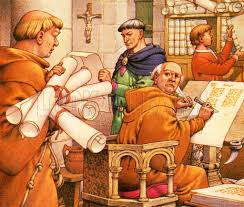
1086 AD
It has been announced that a national survey will begin early in 1086 and is expected to be completed by late July.
The idea was first mooted at the end of last year at the Christmas Court at Gloucester when the King’s think tank had ‘very deep conversation’ about problems of fiscal policy and national defence. To counter hostile threats from Flanders and Denmark, the King established a raiding army of mounted men and infantry made up of volunteers from Brittany, Maine and Normandy. These troops were brought into England last year and have since been billeted around the country on baronial households and manors in order to cut costs to the national exchequer. But the cuts are insufficient and now an inquiry is to be conducted into the whole issue of landholding, wealth and income in England.
How it will be done
A secretariat has been established and officials appointed to undertake this groundbreaking fact-finding mission, already dubbed by some detractors ‘the Domesday Survey.’
In an unprecedented move by the government, Commissioners are to be sent around the country to take a survey of the present system of landholding. For this immense undertaking, the whole realm will be divided into seven circuits with four assessors assigned to each circuit where they will visit regional towns and villages to convene ‘juries’ and inquire into issues such as population distribution, land productivity and yield, capital investment such as ploughs, mills, fisheries, managed woodland, eel ponds etc and will assess the taxable wealth of every local landholder, ecclesiastical and lay. Where land-holding is subject to dispute, the Commissioners will rule definitively and without appeal, a circumstance which has alarmed many of those dispossessed of familial lands at the Conquest who have been seeking redress for twenty years.
How many pigs live here?
A series of questions has been drawn up which will establish how the land is occupied, by what kind of people in every shire, what is held by the Crown, what by the Bishops, Archbishops and Abbots, what by tenants-in-chief and under-tenants; how many souls in every place, how many sheep, cattle, pigs and oxen, how many cottagers, sokeman, villiens and so on. The assessors will record the taxable yield of each area, what each manor is worth, what it is called, who holds it, who held it in the time of King Edward, what it is worth now, what it was worth then.
A national archive
Once collected, this data will be sent to the Royal Chancellery for analysis before being engrossed and bound into a single book, already dubbed the ‘Domesday Book’ by those who see it as an instrument of unalterable judgement (dome).
Many fear that a database of national production and income will be the first step towards swingeing tax hikes as a means of raising revenue, not only for defence as originally proposed, but also for prestige building projects such as the more than one thousand castles and cathedrals constructed in the first twenty years of this government.
A spokesman from the royal treasury commented: ‘We do not envisage any tax rises in the near future.’
